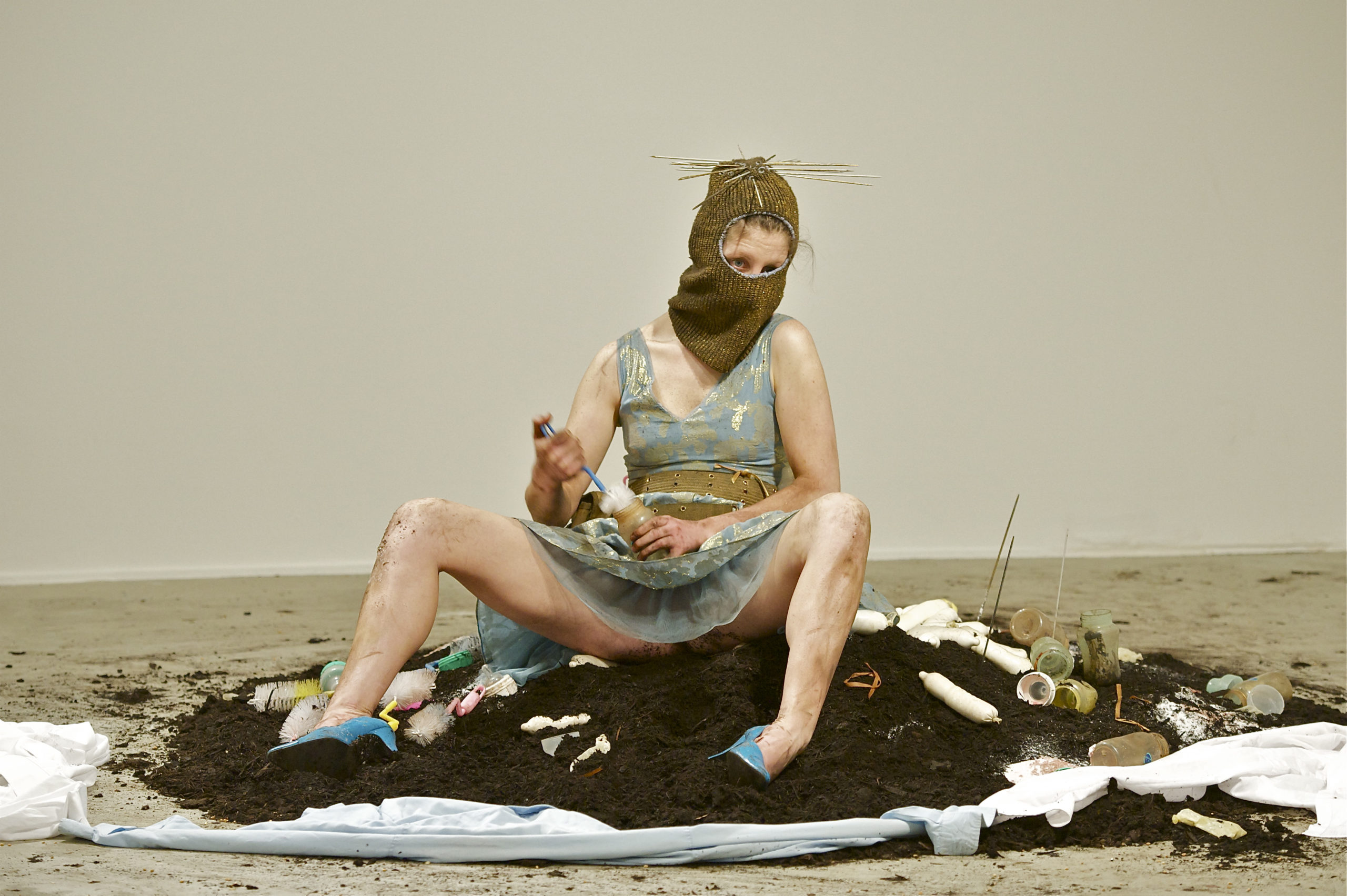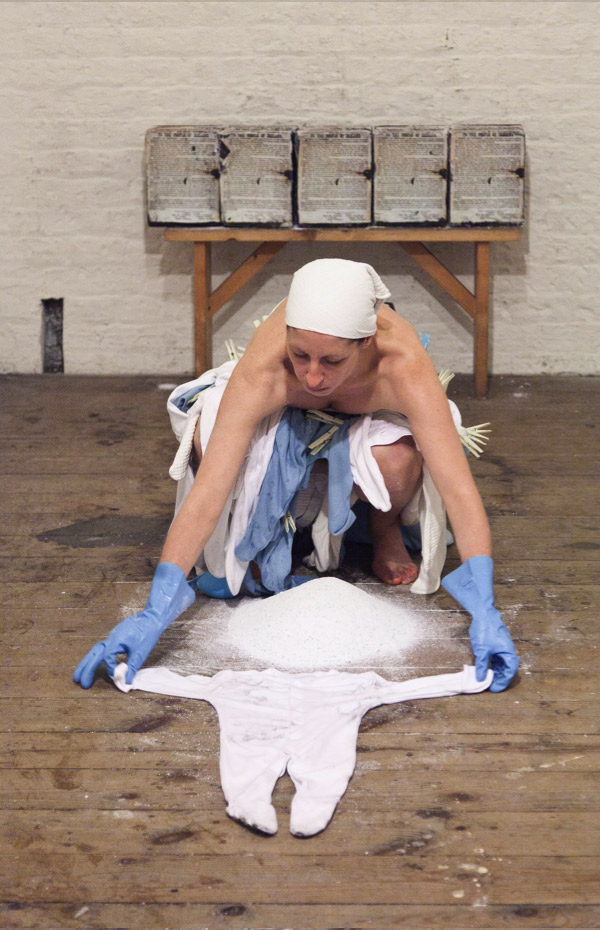- Introduction
- Three listening rituals in Sonic Migrations
- Sitting in the garden, watching the birds with mum…
- Performing Resistance, Care and Labour: Feminist Art and Activism in an Irish Context
- The Anchor, The Drum, The Ship
- Hevaltî – Revolutionary friendship as radical care
- Dayra and Communal Debt
- Budget Commission
- CONTRIBUTORS & CREDITS
- Download PDF
PERFORMING RESISTANCE, CARE AND LABOUR: FEMINIST ART AND ACTIVISM IN AN IRISH CONTEXT
0:00
0:00
Drawing on my experience as a live artist, feminist activist and member of the London-Irish diaspora, this article considers the overlapping connections between feminist art and activist campaigns in challenging patriarchal oppression in an Irish context.
It explores how feminist artists and activists have maintained networks of care and forged solidarity across borders, alongside the role of performance in making feminist legacies of care, labour and resistance visible.
In an Irish context, as elsewhere, artists attempted to counter the exclusionary sexism inherent within systems of representation by collectivising to gain recognition for their work and expertise. Kate Antosik-Parsons details the establishment of Irish Women Artists Link (IWAL) in London in 1986, alongside Women’s Artists Action group (WAAG) in Dublin and Northern Irish Women Artists Group (NIWAG) in 1987. These groups operated as a vital support network for women artists, including artists working in the then emerging field of performance art. Antosik-Parsons records that WAAG’s constitution sought to ‘promote a viable system that provides an opportunity for realistic economic survival in the Arts, including financial parity and equal access to grants, funding, and employment for women’ (2015, p.203). Demonstrating cross-border solidarity WAAG allied with international feminist groups to pursue such objectives. Despite the valiant efforts of these groups, change was slow to progress as demonstrated by the statistics compiled in Project Ireland (2009-2010) by the Guerrilla Girls, an anonymous collective that have highlighted the sexism inherent in patriarchal systems of representation since 1985. A poster from this project, outlines full professors at the University of Ulster as 70% male and department heads at The National College of Art and Design in Dublin as 89% male. Yet over two thirds of the students in both institutions were female. This highlights that the high presence of females undertaking education in the arts was not mirrored in teaching positions at the institutions where they studied. At the time there were numerous factors that negatively impacted upon the progression of female artists and academics in Ireland. For example, when Project Ireland was produced almost complete bans on abortion were in place within both the Republic of Ireland and Northern Ireland.
For example, The Artists Campaign to Repeal the 8th Amendment supported the successful legalising of abortion in The Republic in 2018. Their work included a performative street procession that began at the Clare Street Campus of Limerick School of Art and Design, where I studied. This was formerly a Magdalen Laundry; institutions run by Catholic religious orders where women were detained and forced to work unwaged in industrial laundries. The histories of these institutions informed LABOUR, a touring exhibition of durational Live Art, focused on issues of gender and Labour that I co-curated in 2012.

1. Helena Walsh, (2012) In Pursuit of Pleasure, LABOUR, Void Gallery (Photo Jordan Hutchings)
Additionally, Belfast-based winners of the 2021 Turner Prize, the Array Collective, that create ‘collaborative actions in response to the socio-political issues facing Northern Ireland,’ often using performance, advocated for the decriminalisation of abortion in the north, which was achieved in 2019. Performance was equally mobilised by the London-based direct action feminist performance group Speaking of IMELDA (Ireland Making England the Legal Destination for Abortion), which I co-founded in 2013. This intergenerational collective included former members of Irish Women’s Abortion Support Group (IWASG), who between 1980 and 2000, aided abortion seekers from the island of Ireland that made the often arduous and costly journey to England. IWASG members met them at stations, accompanied them to clinics and housed them. Speaking of IMELDA creatively retrieved the forms of care undertaken by the London-Irish feminist diaspora in the past and inserted them into recent reproductive rights campaigns. Such broadened understandings of feminist activist histories and emphasised longstanding state failures, including the delegating of care for citizens across the Irish sea.
Similarly, through creative expressions of their material conditions, feminist artists have enabled understandings of forms of labour and care often dismissed in dominant discourse, including reproductive labour.

Helena Walsh (2010) Invisible Stains Right Here Right Now Kilmainham Gaol, Dublin. Photo Joseph Carr
Of course, second-wave feminist activist campaigns, such as Wages for Housework – that celebrated their 50th anniversary this year – focused attention on the inequalities of capitalist systems reliant on unpaid housework and reproductive labour. The arguments put forth by the Wages for Housework remain relevant to unpaid carers and domestic labourers today. And, as the wave of strikes across multiple sectors in UK this year demonstrate; for waged workers conditions remain poor and pay insufficiently low in relation to inflation, tax hikes and a new wave of austerity.
Through their, often voluntary labour, cultural workers have incrementally kicked open the door of cultural institutions to enable greater visibility for women and other marginalised identities. Given the increasingly precarious and insecure employment prevalent within the arts sector, cultural institutions and arts academies, exasperated by a post-pandemic cost-of-living crisis and a return to austerity, which also threatens arts funding, keeping this door ajar remains a battle. It is questionable how time-poor cultural workers can continually sustain creative practices, let alone collective networks of care and voluntary cultural activism. How then can art institutions sustain equal systems of representation if participation in the arts becomes unviable to those without recourse to support? Interestingly, in the Republic of Ireland an Arts and Culture Taskforce concerned with Covid 19 recovery was established in 2020. As a result, a Basic Income for the Arts (BIA) scheme is currently being piloted. The pilot scheme runs from 2022 to 2025 and was allotted €25 million in the 2022 Budget. Two thousand eligible applicants were chosen via random anonymised selection, which was checked to ensure adequate representation. Each selected BIA applicant will receive a grant of €325 a week. It is not assured that this scheme will continue past 2025. However, the possibilities of a Basic Income for artists and creative arts workers holds the potential to keep once shut doors wide open, and could perhaps, enable new visions of what care might look like for all workers.
Antosik-Parsons, K. (2015) ‘The Development of Irish Feminist Performance Art in the 1980s and Early 1990s’ in Phillips, Á. (2015) Performance Art in Ireland: A History. Bristol and London: Intellect and the Live Art Development Agency.